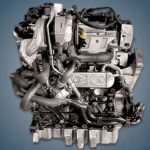The 1.6-liter direct-injection engine Volkswagen BAD was produced from 2001 to 2005 and was installed on the fourth generation Golf, the Bora sedan similar to it, as well as the Audi A2. This power unit differed from its counterparts by a timing belt drive instead of a chain.
The EA111-FSI series includes: ARR, BKG, BAD, BAG, BLF.
Specifications
| Production years | 2001-2005 |
| Displacement, cc | 1598 |
| Fuel system | direct injection |
| Power output, hp | 110 |
| Torque output, Nm | 155 |
| Cylinder block | aluminum R4 |
| Block head | aluminum 16v |
| Cylinder bore, mm | 76.5 |
| Piston stroke, mm | 86.9 |
| Compression ratio | 12.0 |
| Features | DOHC |
| Hydraulic lifters | yes |
| Timing drive | belt |
| Phase regulator | on the intake shaft |
| Turbocharging | no |
| Recommended engine oil | 5W-30 |
| Engine oil capacity, liter | 3.6 |
| Fuel type | petrol |
| Euro standards | EURO 4 |
| Fuel consumption, L/100 km (for VW Bora 2002) — city — highway — combined |
8.9 5.2 6.2 |
| Engine lifespan, km | ~220 000 |
The engine was installed on:
- Audi A2 1 (8Z) in 2002 – 2005;
- Volkswagen Bora 1 (1J) in 2001 – 2005;
- Volkswagen Golf 4 (1J) in 2001 – 2003.
Disadvantages of the VW BAD engine
- A very complex intake system with a lot of sensors constantly fails.
- The motor not only breaks down regularly, but also requires highly qualified service.
- Intake valves, throttle valve and EGR valve are quickly overgrown with soot.
- Even before 100,000 km, ignition coils or a phase regulator often fail.
- Oil burning due to the occurrence of rings usually begins to run 100 – 120 thousand km.






